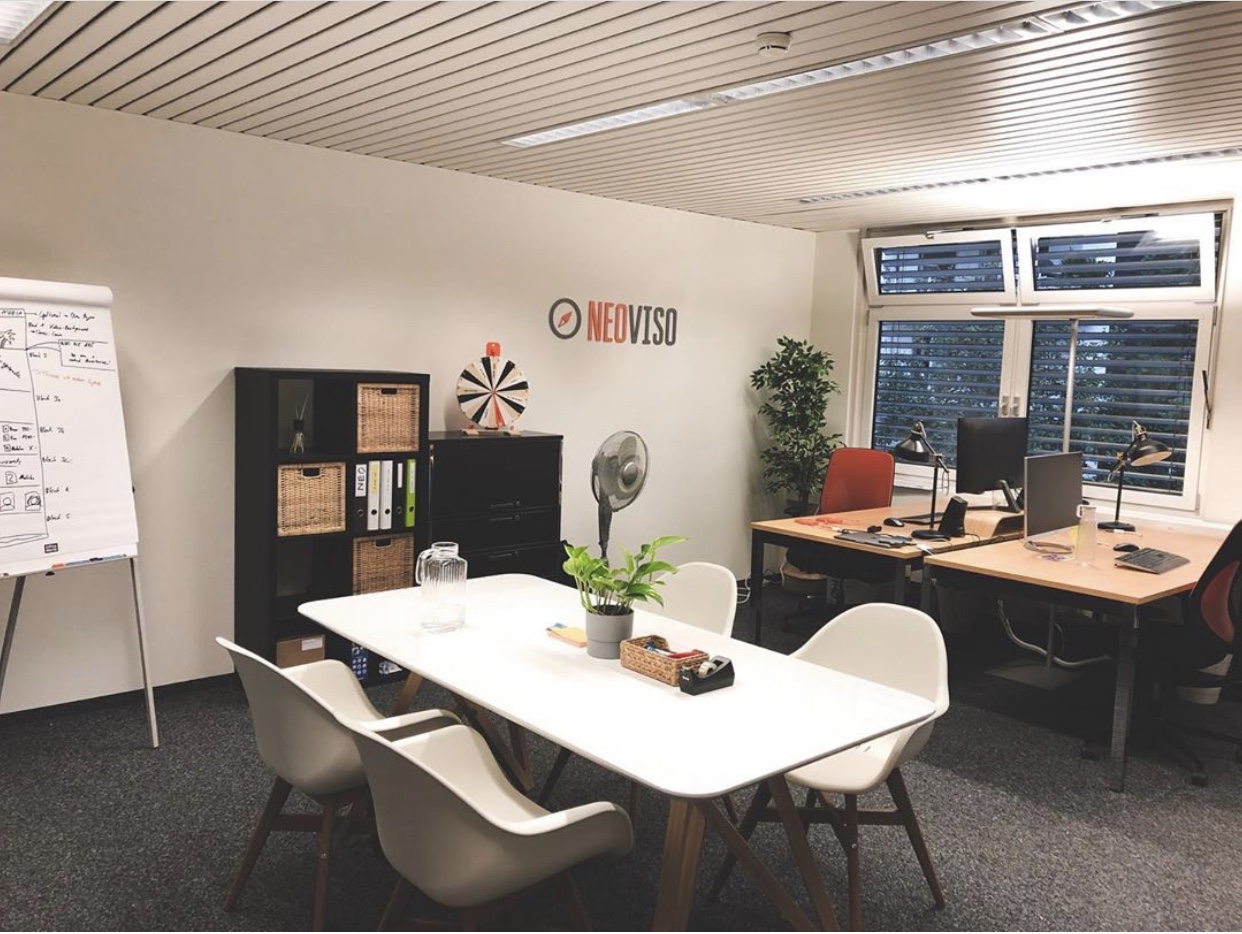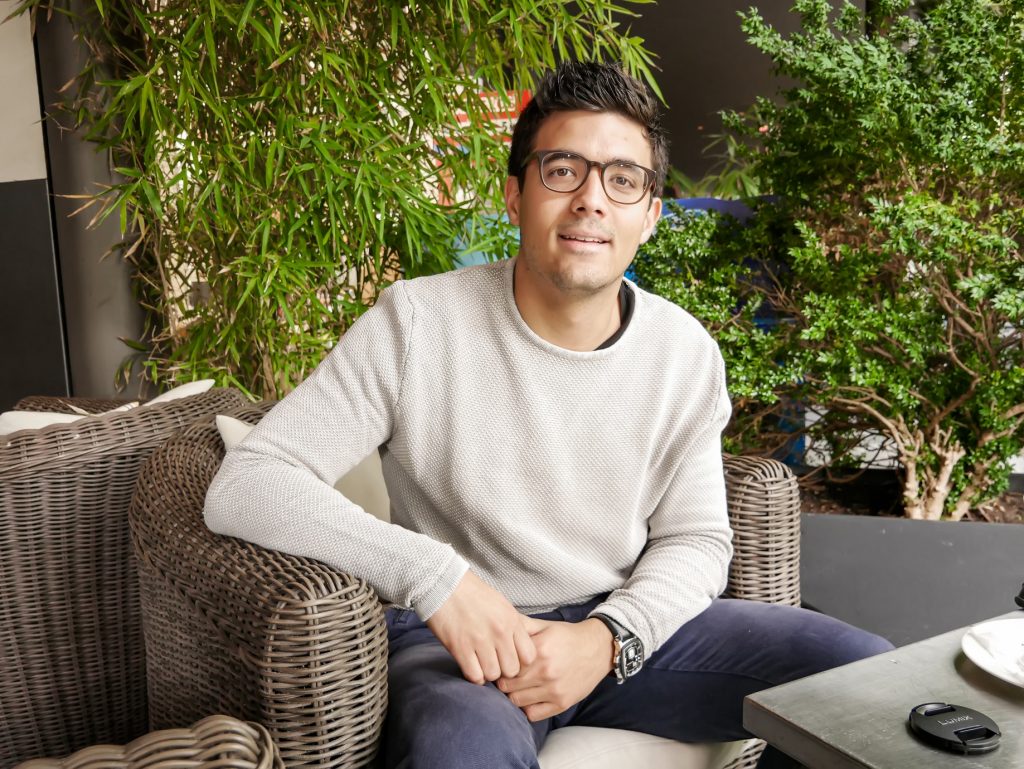Interview with the founder of a startup that revolutionized the airline industry through computer vision.
Yannick Blättler
Founder of the consulting agency NEOVISO

Yannick Blättler – entrepreneur of a new generation, who founded his company during his studies and within only three years turned it into one of the most recognizable brands in his niche. His consulting agency NEOVISO specializes in Generation Z and offers market research, communication strategies and content creation services. Alongside this, Yannick runs a popular Vlog, gives talks to senior managers and interviews for media giants such as CNN.
What is the secret of his business approach? In this interview, we tried to find out more and spoke to Yannick about what helped him win market-leading companies as customers, what’s so special about Generation Z, how coffee meetings boost business, and what content you need to share to succeed in social media.

Yannick, your career path is truly impressive: fast-growing consulting firm, presentations to business leaders, interviews for international media. What an achievement for a 26-year-old guy. Have you always been so entrepreneurial?
For as long as I can remember, I have been very active in developing ideas. Even when I was at school I organized events with my friends and started a project to earn money for the class graduation trip.
Does this mean that you never hesitated about your professional path?
Actually, I had also considered a music career. As a teenager I played the trumpet, piano and drums, was part of a band and wrote my own music. It was a lot of fun. So I hesitated between musical and entrepreneurial ways. But eventually I decided to study business administration at the University of Zurich, and that’s where my business journey began.
Tell us a little more about the beginning of this journey: What was the starting point?
During our studies my friend and I found it disappointing that there were almost no opportunities to get to know companies. In lectures you hear how digitalization and modern technologies are changing business, but you don’t see real examples, don’t interact with the companies to learn more about their future strategies.
That’s how the idea was born to create a NeoNetwork – a student association aiming to explore tomorrow’s challenges. We invited various companies to the university for 60-90 minutes talks about their business and especially about the future. We organized the participation of market leaders like Swisscom, Uber, Microsoft and smaller innovative companies like Doodle. The project developed rapidly; today the association is active at six universities in Switzerland and is operated by 28 people.
Thanks to the rotary clubs, I had the opportunity to speak in front of 50 entrepreneurs and top-level managers.
Sounds very exciting. And how did this project turn into a business?
This experience has shown me that many companies have a great interest in young people. They wanted to make contact, understand how to attract young talent, how to know what they were up to. I started making short talks and speeches for these companies and very quickly noticed that they saw value in it and were willing to pay for these insights.
As far as I understand, these companies have started to invite you to give talks and presentations. How did they find out about you?
I did two things in the beginning. I sent e-mails to random companies with a short outline of what I did. Second, I wrote to about 10 or 15 Rotary clubs, and I was invited by two of them. They are always looking for speakers because they want an interesting program. Although they never pay their speakers, it is a good opportunity to present yourself to a wider audience. Thanks to these clubs, I had the opportunity to speak in front of 50 entrepreneurs and top-level managers. That’s how they got to know me; some of them later became my clients.

Right from the start, you’ve been giving speeches on Generation Z. Why exactly about it?
There was already a buzz around Gen Y at that time, with companies and consultants specializing in it. While Gen Z was something completely new, no one had studied it properly. These are people who were born between 1995 and 2010, so they are young but soon to be potential employees and customers. I saw that this niche was a free market spot that nobody was covering. Coming almost from this generation myself (born in 1993) I have access to and understanding of how things work for young people, so I decided to focus on them.
When I started doing the talks, I realized that I needed to have a legitimate company to bill those who invited me. Even if it was only several hundred francs, I couldn’t charge it through the student organization.
Seems like your business was born organically. And just like that you founded a company?
At that time, I sat together with my dad, we had a bottle of wine and he offered to help me found a GmbH. He gave me 50% of the starting capital and became an equal partner. Recently, just a few months ago, I repaid him the entire investment part and officially became the sole owner of the company.
It’s actually quite interesting how quickly you get involved in big things as a representative of the young generation.
It’s great to have such support. So, your father totally believed in you, or was he convinced of your business plan, for example?
I think both. To tell the truth, I never had a business plan. But what I did have was kind of a proof of concept, because people started asking me to give talks and presentations even before the company was officially founded. It’s actually quite interesting how quickly you get involved in big things as a representative of the young generation. As an example, I was invited to the British Swiss Chamber of Commerce for a panel discussion on robotics which the heads of international companies took part in. While I was just a young guy with no solid experience. So, my dad said, “Seems like your business is going to work. Let’s do it!”
When did you officially found the company and what did it look like back then?
I founded a company right after completing my bachelor’s degree. I had 9 months till the beginning of my Master studies in Sankt Gallen, so I was completely free and could fully concentrate on building my business. In my parents’ house I had an additional room which I turned into the office and I worked from there.
In the beginning I gave the talks as a student, just sharing my own experiences. Very soon, however, I realized that I had to start doing market research, focus groups and surveys to support my words. This was one of the most important development directions within the last two years.
And what services does your company offer today?
We offer very specific research on Generation Z and emphasize that these young people are your future employees and customers. So, you have to understand them today to attract them tomorrow. We also offer strategy development as well as social media planning and creation of marketing concepts.
As well as all this we have a new brand Modular Media – a powerhouse for content production where we do brand photography, videos, design and so on. If you want to grow in social media today, you need to create a lot of high-quality digital content. Our team can get you covered. And of course I continue to give talks, presentations and workshops.
Who is the audience of your talks and presentations? How do they usually react?
Very often I speak in front of the executives of companies or marketing experts. In the beginning I actually asked myself: are they really interested or is this just for fun for them? Imagine I came there as a 23-year-old guy who was still studying at university. At first, the business representatives were a bit hesitant, they probably thought – what on earth can this ‘teenager’ teach us? But after 20-30 minutes they see that I’m open to discussion and comfortable with provocative things. They start to get more involved and ask practical questions, e.g. about digital tools. From my side, I’m always happy when I can share the ideas of the young generation with business representatives.
Photo: @neoviso
Speaking about Generation Z, what is so unique about it and what distinguishes it from others?
The most interesting thing about Gen Z is the context in which they are growing up – social media, smartphones, digital services. This differentiates their needs and the way they interact with brands, businesses and services. In general, there are 3 important characteristics: Gen Z wants to have everything immediately, to have flexibility in acquiring services and products and needs clarity in life. They have plenty of options, so they want to know in advance what they will get for their efforts, for example at work.
Aren’t we all willing to know what we get out of work?:)
Well, of course. But for example, Generation Y (born between 1982 and 1995) is usually described as very career-driven and achievement-oriented. While Gen Z is rethinking. If they accept working 16 hours a day, they do it from a rational point of what they get back for it. A work-life balance is very important to them. At the same time, I don’t like the opinion that young people do not want to work anymore.
You know, recent studies have shown that young people do not engage in entrepreneurship precisely because it requires them to work overtime to be successful?
Exactly, but that does not mean that they are lazy. They simply don’t want to put work at the centre of their lives. If they know that they can have a good standard of living as employees with normal working hours, they can consciously make that decision over building a business.
Well, it seems you had a different opinion about entrepreneurship. Why?
I think I’ve always been an entrepreneurial person, wanted to create my own projects. I wasn’t sure what it should be, but I kept my eyes open and looked for the right business idea. However, I must admit that I didn’t realize earlier how much work and effort it takes to build a company. Only after 3 years in a row I learned how intensive it can be to work on my own, to study, to write a master thesis, to do the group work.
I try to use every minute. For example, sometimes I take a train instead of driving just because it gives me extra time to work.
How do you actually combine business and studies?
Organizing, planning, scheduling everything. I have a digital to-do list and a calendar that is almost always completely full. I really plan where and when I will do workouts, readings, video recordings, etc. My laptop and camera are with me all the time, so I am flexible and can work from anywhere. I try to use every minute. For example, sometimes I take a train instead of driving just because it gives me extra time to work.
With such a full schedule, do you have time to relax and unwind?
As a matter of fact, I do. It may not be enough at the moment, but I definitely find time for fun. I try not to miss going out on a Friday or Saturday night. I really enjoy spending time with friends, having dinner, drinks and discussing everything but business. It’s a good contrast to what you normally do – putting the work aside and enjoying the evening.
Apparently, this approach is working great in terms of the rapid development of your business. This year you took the next step, didn’t you?
That’s true, this February I rented my very first office space, a 40 square metre office in Hergiswil. Until then I only had one official employee who is a project assistant and social media specialist, and now we are already a team of four. We have hired a market research expert and a full-time photo and video maker.

Photo: @neoviso
That’s very fast for a young company. How did you grow so quickly?
That has just evolved. In the beginning, I did a lot of video project work myself, which helped to cross-finance other expenses that I couldn’t always cover with consulting work. The more consulting contracts I received, the less time I had to create content, so I finally decided to entrust this part of the work to a new employee and focus more on NEOVISO and Gen Z consulting.
Looking back, can you tell us how your experience with the student association helped you develop the business?
The most important thing I got from NeoNetwork was connections. Through this project, we have made contact with the senior managers of large companies, who are usually very difficult to reach. We had a good reason to contact them and gave value without asking for anything in return. So the association was a great help in building connections in the market.
To tell the truth, over the last 3 years in particular I’ve realized how deeply important your network is and how long it takes to build it. You often read in motivating quotes: ‘Work hard, but be patient.’ This is what I would definitely refer to when networking.
I did so many coffee meetings and dinners just for this reason: to meet new people and have conversations.
In this area, too, you took an active approach and consciously expanded your network, didn’t you?
Exactly. I traveled all over Switzerland, met people just because it was an interesting talk. I did so many coffee meetings and dinners just for this reason: to meet new people and have conversations. I’ve never seen it as an opportunity to sell my services directly, never went full in sales. On the contrary, I shared the latest news and research or gave some tips.
I’m also trying to connect with people my age, because clearly over the next few years they’ll be joining large corporations or local businesses, taking on some management roles and hopefully working with me as well. I go to parties and events, talk to people, tell them what I’m doing.
You also share a lot of useful content online. This helps you promote your personal brand, right?
Yes, that’s true. I still don’t know which social media pages are more valuable to the company – my personal accounts or NEOVISO. It happened pretty organically because I like to make videos, take nice photos, write blog articles. I like to share my knowledge and also see how personal branding contributes to the promotion of the business.
However, NEOVISO is a strong brand itself. As I have always been interested in branding, I tried from the beginning to make it cool and catchy. Moreover, I wanted it to be authentic, to show that we are young, dynamic, honest and doing things differently. That’s why video marketing is an important part of our advertising concept. Today NEOVISO is already severe enough to function even without my active involvement. That is also an interesting transition of the company.

You’ve already achieved a lot, but I’m sure you have even more ambitious plans for the future. How do you see the company developing over the next 5-10 years?
I want NEOVISO to become the largest consulting company analyzing future customers. I would also like to see it growing internationally, with the aim of understanding this generation in general, not only within the Swiss market. Finally, I plan not only to concentrate on the Gen Z, but to consistently build bridges between different generations.
As an entrepreneur, what advice can you give to those who want to start their own business?
What I would definitely recommend is to invest time in networking and really valuable connections. Big network does not mean having 3000 contacts in LinkedIn, it’s rather having had 300 small meetings for coffee and face-to-face communication. Second, don’t oversell your product, build interest and trust instead. Finally, work on your personal brand. But do not try to create a fictional image of yourself which is not true. Be authentic, share your knowledge and put it into your own words.
Thank you very much for this inspiring conversation and your valuable tips. We wish you every success with your project!

Learn more about NEOVISO:
Learn more about NEOVISO
Website: https://neoviso.ch/
Facebook: https://www.facebook.com/neoviso.ch
LinkedIn: https://www.linkedin.com/in/yannick-blaettler/
Instagram: https://www.instagram.com/neoviso/
YouTube: https://www.youtube.com/user/TheWickedNick1/featured













